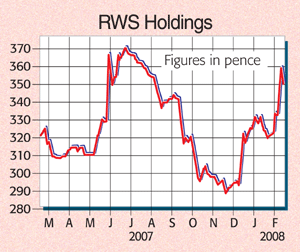
Is a business ever recession-proof? The City seems to think this stock is, but Paul Hill believes its share price has now been pushed up to vulnerable levels.
RWS Holdings (RWS), tipped as a BUY by The Times
RWS is Europe’s leading provider of patent and document translation services, with about 5% of the global market. Multinational clients include AstraZeneca and Peugeot. Patent translations form the bulk of its activities (79% of revenues), with the rest coming from other commercial (14%) and information (7%) services.
Each year around a million patents are filed globally – about 20% originate in Europe. The industry has doubled in size over the past decade amid greater corporate spending on research and development and a growing number of patent challenges from copycat rivals. RWS Holdings has ridden the coat-tails of this trend and is also benefiting from the euro’s strength – about 65% of turnover is denominated in euros, but most of its costs are in pounds.
So the group has a strong position in a defensive market. But I think this is as good as it gets. There are several headwinds that could hurt its future performance. First, nearly 10% of its profits will be wiped out due to the introduction of the new European directive known as the London Agreement. The EEC has pledged to cut down on red tape. Hence from May, firms wishing to file a European-wide patent will not need it translated into all local languages. As long as the original is drafted in English, French or German, only the executive summary will need to be converted. This will blow a £2m hole in RWS Holdings’ annual pre-tax profit.
To offset this hit, it is ramping up its acquisitions to boost its non-patent operations – the latest deal being the £6.8m purchase of German specialist DCS. But this strategy is inherently more risky than relying on organic growth.
And the patent industry is not recession-proof. Sure, patent work is usually tied to long-term research projects and thus should be less cyclical. But if there is a slowdown, research spending will be cut. With clever translation software being developed all the time, much of the firm’s routine work may become automated, shrinking its fees.
Lastly, its valuation looks vulnerable. The shares trade on 2007 multiples of 15 times earnings and 2.5 times sales, which seems rather stretched. I’d value the stock on a 12 times p/e, equating to around 275p per share, or about 20% lower than today. If demand softens, its profit margins of over 20% could also come under attack.
Recommendation: TAKE PROFITS at 351p
• Paul Hill also writes a weekly share-tipping newsletter, Precision Guided Investments